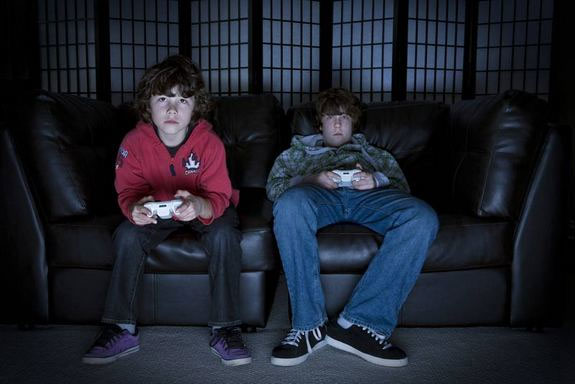Do Violent Games Boost Aggression? Study Adds Fire to Debate

Children who play violent video games may experience an increase in aggressive thoughts, which in turn, could boost their aggressive behavior, a controversial new study conducted in Singapore suggests.
In the study, children ages 8 to 17 who played a lot of violent video games showed an increase in aggressive behavior — such as hitting, shoving and pushing — three years later, compared to their behavior at the study start.
Meanwhile, those who decreased the amount of time they spent playing violent video games saw a decrease in aggressive behavior, the researchers said. [9 Weird Ways Kids Can Get Hurt]
The reason for the increase in aggressive behavior was that children who played a lot of violent video games had an increase in aggressive thoughts: for instance, they were more likely to interpret an ambiguous act, like someone bumping into them, as hostile, said study researcher Craig Anderson, a psychologist and professor at Iowa State University. They were also more likely to see aggressive behavior as an appropriate way to respond to provocation, Anderson said.
"Children and adolescents who play a lot of [violent] games change over time, they start to see aggressive solutions as being more reasonable," ways to respond to conflict or frustration, Anderson told Live Science.
However, experts not involved with the study say that the research has flaws, and does not add anything meaningful to the debate over whether violent video games increase aggression, which has been a contentious issue. They also say that other researchers should be allowed to analyze the data, to see if they find the same result.
Study criticism
Sign up for the Live Science daily newsletter now
Get the world’s most fascinating discoveries delivered straight to your inbox.
Studies on whether violent video games lead to aggression in children have been mixed: some studies have found a strong connection, while others find no link.
Christopher Ferguson, an associate professor of psychology at Stentson University in DeLand, Fla., who was not involved in the new study, said that data used in the new study has been used in the past to make connections between violent video games and aggression, but that such work has been previously criticized.
"Given that this data has been out there already, and that there's so many problems, I don think that's much here for parents or policy makers to take away from it," Ferguson said.
One issue is that the study asked only the children themselves to rate the violence of their video games, which could bias the results, Ferguson said.
Ferguson noted that despite increases in violent games, movies and television programs in recent decades, youth violence has not increased. "If video games really did have this direct, linear affect, we would be able to see it in society, and we're not," he said.
Andrew Przybylski, a social scientist at the University of Oxford in the United Kingdom, agreed, saying the new study is "weakened by analytical shortcomings that make it difficult for me to assess where it fits in the debate."
Przybylski said the study does not provide an important number known as the effect size, which would describe how much violent video games account for aggressive behavior. This is important because researchers have debated whether video games really increase aggressive behavior more than other factors, such as substance abuse, or even just having siblings, Przybylski said.
What can parents do?
Anderson said that parents should pay close attention to their child's media habits, and substitute games with violent content for those with pro-social content (such as those that involve cooperation), which have been suggested to boost pro-social behavior in the real world.
But Ferguson disagreed. "I think each parent has both the right and responsibility to decide what is best for their family, and also to respect that what works for one family may be different than what works for a different family." He added "it’s best to understand that this is a moral decision, not a public health decision."
Because of these differing opinions, Przybylski called on the researchers of the new study to share their data with others to help move the debate forward.
"This data set is very rich, and this publication raises a lot of questions about how things are being computed," Przybylski said. If the data were shared "then everyone would be looking at the same facts, instead of just trading relatively ideologically driven opinions," Przybylski said.
The study is published today (March 24) in the journal JAMA Pediatrics.
Follow Rachael Rettner @RachaelRettner. Follow Live Science @livescience, Facebook & Google+. Original article on Live Science.

Rachael is a Live Science contributor, and was a former channel editor and senior writer for Live Science between 2010 and 2022. She has a master's degree in journalism from New York University's Science, Health and Environmental Reporting Program. She also holds a B.S. in molecular biology and an M.S. in biology from the University of California, San Diego. Her work has appeared in Scienceline, The Washington Post and Scientific American.









